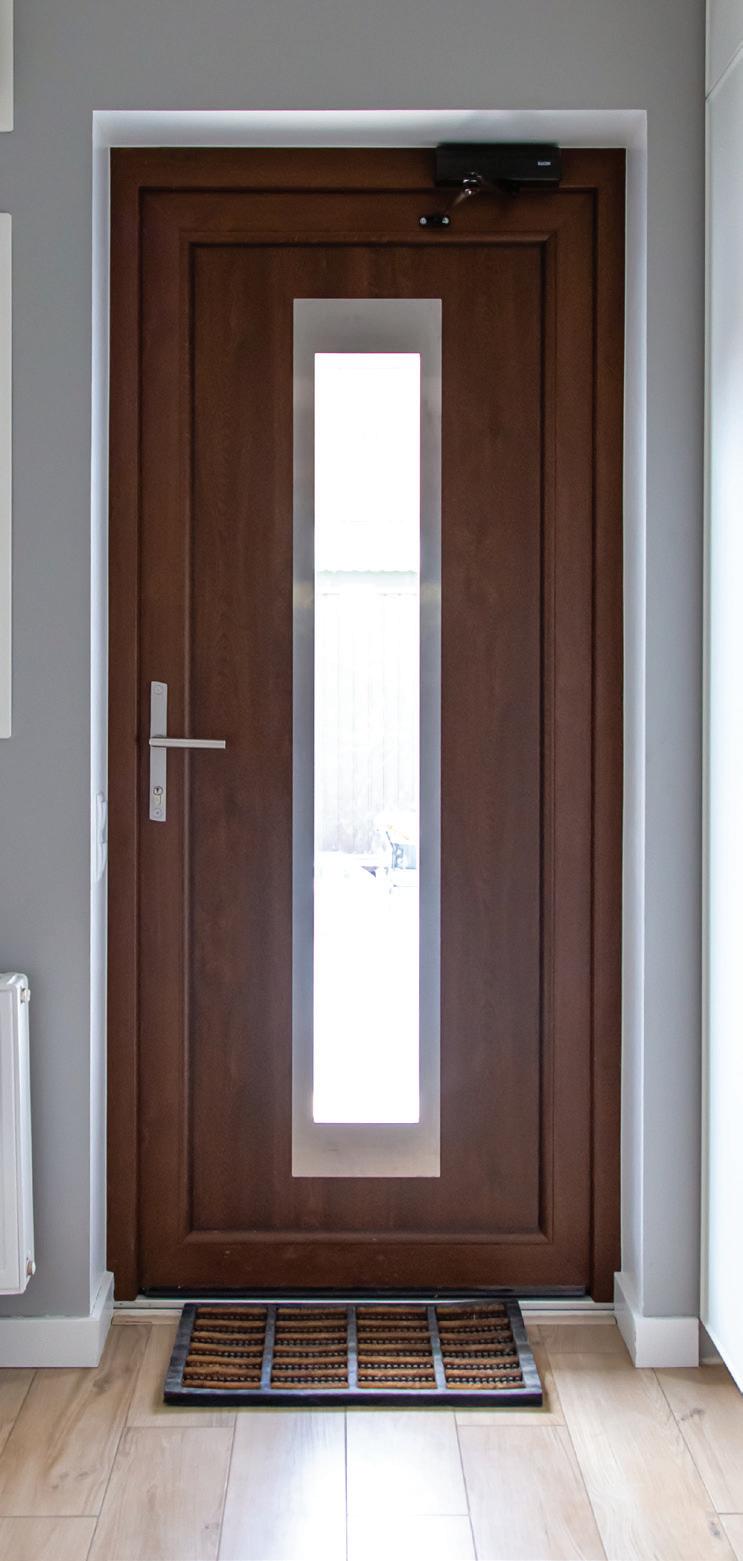

ARIZONA
HOME SELLER’S GUIDE
A STEP BY STEP PROCESS

meet
LISA
& COLE MOSER
THE JRM REAL ESTATE GROUP - ELEVATING YOUR SELLING EXPERIENCE
Selling your home is more than placing a sign in the yard, it’s about maximizing value, minimizing stress, and moving forward with confidence. At The JRM Real Estate Group, Lisa and Cole Moser bring a unique blend of experience, innovation, and dedication to every listing.
Lisa’s extensive background in business leadership, marketing, and project management gives her a strategic edge when it comes to pricing, positioning, and negotiating. She understands that each home has a story, and she ensures it’s presented in a way that captivates the right buyers.
Cole’s relentless drive and technological expertise bring fresh energy to the process. From digital marketing campaigns to advanced market analytics, he ensures your home receives maximum exposure and stands out in today’s competitive landscape. His discipline and attention to detail mean no opportunity is overlooked.
Together, Lisa and Cole create customized strategies designed around your goals. Licensed in Arizona and Montana, they know how to showcase properties across

diverse markets, whether you’re selling a luxury desert retreat, mountain home, or family residence.
The JRM Real Estate Group is built on loyalty, trust, and long-term relationships. Their mission is simple: to deliver an exceptional selling experience that secures the best results while keeping the process clear, seamless, and rewarding.
Ready to take the next step? Let Lisa and Cole guide you with expertise, energy, and care, because your home deserves nothing less.


THE HOME SELLING PROCESS
PREPARE YOUR HOME FOR SALE DETERMINE YOUR SELLING PRICE
2

1
4
REVIEW OFFERS AND NEGOTIATE OPEN ESCROW FUNDS TRANSFERRED & TITLE EXCHANGED SIGN A LISTING AGREEMENT ACCEPT OFFER HOME INSPECTION & REPAIRS SELECT A REALTOR®
3

The term “REALTOR®” identifies a real estate professional who is a member of the NATIONAL ASSOCIATION OF REALTORS® and abides by its strict Code of Ethics. They will direct, guide and represent you through the home-purchase process including:
A Realtor uses market data to set a competitive selling price.
They market your home with professional photos and wide online exposure.
Their negotiation skills help secure the best possible deal.
They handle all the complex paperwork accurately and on time.
Coordinating showings and tasks saves you valuable time.
Their network of professionals speeds up the process when issues arise.
They provide an objective view to keep emotions in check.
Homes sold with Realtors often net 5-10% more than FSBO sales.
They list your home on MLS for maximum buyer reach.
Staging advice from a Realtor can make your home more appealing.
They manage offers and counteroffers with experience and tact.
A Realtor reduces legal risks by ensuring proper documentation.
REAL ESTATE DESIGNATIONS: BENEFITS OF WORKING WITH A REALTOR ®
ABR - Accredited Buyer Representative
CBR - Certified Buyer Representative
CRS - Certified Residential Specialist
GRI - Graduate REALTOR Institute
MRP - Military Relocation Professional
PSA - Pricing Strategy Advisor
RENE - Real Estate Negotiation Expert
CIPS - Certified International Property Specialist
CPM - Certified Property Manager
PREPARING YOUR HOME TO SELL
A home in pristine condition will attract more buyers, sell in the shortest period of time and better position your home for its highest value.
In addition to a clean and inviting appearance, invest the money up front to cover all repairs. Whatever you don’t repair will be noted on the home inspection report. If the repair list is lengthy, some buyers may decide to back out of the agreement, or incorporate the cost of repairs into their negotiations.

To ensure your home shows at its best, here are a few suggestions:
Take an objective account of condition inside and out
Repair any damage throughout
Deep clean – top to bottom
Professionally clean flooring
Clean all windows, repair screens and ensure windows open properly
Repair ceiling leaks and stains
Replace air filters
Paint interior and exterior where necessary selecting neutral colors
Ensure all plumbing and electrical elements are in excellent condition
Clean and ensure proper condition of all kitchen appliances
Remove clutter inside and outside
Store worn furniture out of sight
Remove personal items such as photos and knick-knacks
Groom landscaping – trim and replant where necessary
Enhance the entry way with potted plants and a new welcome mat
RETURN ON YOUR HOME IMPROVEMENTS
When you’re ready to sell your home, rely on the objective opinion of your REALTOR® to offer suggestions on home improvements that will likely offer the highest return on your investment. Below is a brief summary of upgrades that typically reap the highest return according to Realtor.com.
the front door – replace, repaint, replace
more outdoor living space or enhance existing space by adding water features, outdoor fireplace or kitchen area, or new landscaping
indoor living space such as bedroom, bath, walk in closet
the bathroom; new fixtures, mirrors, new paint, redo caulk around tub and shower, replace grout in tile flooring.
Another great resource for your research is the “2021 Cost vs. Value Report,” an annual collaboration between Remodeling Magazine and Realtor Magazine that breaks down the estimated cost of various remodeling projects and the estimated return on investment for those projects by region and by city, as well as by mid-range and upscale projects.
To view the list, visit www.remodeling.hw.net/cost-vs-value/2021



THE IMPORTANCE OF PRICING
Without a doubt, of all of the mistakes that a Seller can make, mispricing the home either too high or too low is the most harmful and costly. Price your home too low, the home will sell, and probably sell quickly, but you will lose money that is rightfully yours. Price the property too high and it will linger on the market and likely not sell, costing money in the form of interest, repairs, upkeep and added stress.
Your REALTOR® will work with you to select the list price that puts your home in the best competitive position to sell for the highest price in the least amount of time. Together, you will review homes like yours that have recently sold, are currently for sale, or have expired or been taken off the market.
The Buyer activity will likely occur within the first couple weeks of your home being on the market. Therefore, pricing it correctly at the onset increases a timely sale with less inconvenience and greater monetary return.

KEY REASONS TO PRICE PROPERLY:
A TIMELY SALE
Chances are that your home will ultimately sell at its fair market value. Pricing it properly at the onset simply increases the likelihood of a timely sale with less inconvenience and greater monetary return.
COMPETITION
Buyers educate themselves by viewing many properties and they will always look at a range of homes priced competitively. They know, or learn very quickly, what is a fair price. If your home is not competitive in value with those they have seen in the same price range, it simply will not sell.
REPUTATION
Overpricing causes most homes to remain on the market too long. Buyers and Agents become aware of the long exposure period and often are hesitant to make an offer because they fear something is wrong with the property. Homes on the market for a long period of time, historically sell for less than their fair market value.
INCONVENIENCE
If overpricing keeps your home from selling promptly, you may end up owning two homes, the one you are trying to sell and the new home you have already purchased. This can prove to be costly, worrisome and very inconvenient.
FOR AN ESTIMATE OF NET PROCEEDS FROM THE SALE OF YOUR HOME, CHECK WITH YOUR REALTOR® .
APPRAISALS & THEIR INFLUENCE
When you sell your house, and the Buyer is applying for a new loan in order to purchase the property. This shows the Buyer’s Lender requires a licensed Appraiser to estimate the market value of the property to show the Lender that they are making a prudent decision lending the Buyer the money to buy your house.
Once the Buyer begins the new loan application process, the Lender will order the appraisal. In order to estimate the market value of your house, the Appraiser will research the sales comparables in your subdivision and/or your immediate area. Appraisers prefer to use sales which have sold within the past 6 months and are similar to yours in regard to square footage, year built and amenities (i.e. swimming pool, garage, single story).
The Appraiser will measure your home, take photographs, and examine your house for its condition, specific improvements and amenities. You can help the Appraiser by preparing a list of recent improvements and remodeling projects, and include their approximate costs. Some Appraisers will appreciate this information while others may not. However, if you prepare the information for buyers looking at your home, then providing it for the Appraiser will be a snap.
The Lender will receive a copy of the appraisal a few days after the appraiser has been to your home. You may be told that the Appraiser has some repair requirements before the lender can loan the Buyer any money on your house. In that case, you must repair these problems and the Appraiser will return for a re-inspection at an additional cost.
If your home does not appraise for the asking price, your Buyer could renegotiate or walk away from the deal. This is why your original asking price should be accurate to the appraised value.
THE HOME INSPECTION PROCESS
HOME INSPECTION
A standard home inspection is typically ordered by the Buyer after an offer is accepted and is a visual examination of the physical structure and major interior systems. It is not to be interpreted as a guarantee of any kind or an insurance policy on the condition of the property. A home inspection is not to be confused with an appraisal, a building code inspection, or a guarantee of any kind and/or an insurance policy on the property.
The Inspector will review the easily-accessible exposed portions of the structure of the home including the roof, attic, walls, ceilings, floors, windows, doors, and foundation, as well as the heating/air conditioning systems, interior plumbing and electrical systems. Potential problems will be noted.
OTHER INSPECTIONS & TESTS TO CONSIDER
Urea Formaldehyde Insulation
Fungi, mold & allergens
Air Quality
Lead Paint
Termite
Sewer
Pool

13 SELLING MISTAKES TO AVOID
1. PRICING YOUR HOME TOO HIGH
A Real Estate Agent can research comparable sales in your area and advise you for the appropriate price range of your property.
2. TAKING AN INFLEXIBLE POSITION ON FINANCING
Have your Agent explain what financing options are available. Being flexible on financing terms may secure a better selling price, with other advantages as well.
3. ERRORS IN MARKET TIMING
Ask your Agent to determine whether the market cycle is poised to net you the most money.
4. NOT PROVIDING EASY ACCESS FOR SHOWINGS
There are many ways to show a home. “Appointment Only” is the most restrictive. Lock boxes (key safes) are the most accessible. If your home is easy for Agents to show, more prospective Buyers will see it, improving your odds of getting the deal you want. However, your specific lifestyle may not be compatible with frequent showings. Your Agent will help you determine a solution that will best fit your situation.
5. NOT UTILIZING CURRENT MARKET TECHNOLOGY
Make sure your Agent is up with the latest technology and resources available. Check around to see what technology is being utilized in your specific area. A good Agent will know where you can get the best exposure.
6. NOT “STAGING” YOUR PROPERTY CORRECTLY
Reference the sections on “Preparing Your Home To Sell” and “Preparing Your Home To Show” for tips on setting the stage for your home showings.
7. BELIEVING SELLING PROPERTY IS SEASONAL
Don’t base your selling decision on a season. Properties sell all year long.
8. PRICING YOUR PROPERTY TOO LOW
Hiring an Agent ensures no money is left on the table.
9. BELIEVING YOUR AGENT IS NOT DOING THEIR JOB WHEN THERE AREN’T ANY OFFERS
If your home shows well, but hasn’t generated any interested Buyers, it may be time to re-evaluate the price.

10. IGNORING THE IMPORTANCE OF FIRST IMPRESSIONS
Sales have been blown by unkempt lawns, cluttered closets, unpainted front doors, hard-to-work locks, blown light bulbs, bad colors, stains, unlit areas and bad smells. Spend time on the little things. Double up on your gardening, keep things cleaner than usual. Take serious control of your pets during this period.
11. NOT MAKING THE RIGHT KIND OF REPAIRS
Don’t be tempted to make improvements prior to listing without consulting your Agent. Some upgrades will not yield any real increase in value, while others may increase property value substantially.
12. NOT GIVING THE SALES EFFORT ENOUGH TIME
You should never give too little time to what is inherently a long process. Homes may take 3-6 months to sell, in any market. Estimate how much time you have before you need to sell and then plan ahead to allow extra time. You don’t want to be forced to accept a disappointing offer.
13. NOT SCREENING PROSPECTS ADEQUATELY
One of the best reasons for hiring an Agent is their ability to prequalify a prospect financially before valuable negotiation time is lost. More importantly, your Agent may discover when a prospect has an ulterior motive for shopping homes, other than purchasing.

WHEN AN OFFER IS RECEIVED
When a buyer makes an offer on your home, the sales process begins. It will likely include the following:
PURCHASE CONTRACT PREPARED WITH OFFER
The Buyer’s Agent will prepare the Purchase Contract on behalf of the buyer. This agreement will include the buyer’s terms of the purchase including how much they are offering for the home and any contingencies, such as home inspections or lender appraisal. Earnest money may also be included. Upon completion of the Purchase Contract, the Buyer’s Agent will contact the Seller’s Agent to present the offer.
OFFER IS ACCEPTED OR COUNTERED
The Seller will evaluate the offer then accept the terms or prepare a counter offer.
NET PROCEEDS
The Seller’s Agent may prepare a Net Proceeds Statement for the Seller. This will detail the estimated costs to sell the home and how much the Seller will actually receive under the terms of the offer.
CLOSING PROCESS BEGINS
If the Seller accepts, the closing process will begin. If you counter, the ball is back in the Buyer’s court and the Buyer must decide if they will accept, reject, or counter the counter offer.
WHEN IN DOUBT, DISCLOSE
Sellers are obligated by law to disclose all known material facts about the property to the Buyer. The Arizona Association of REALTORS® Seller’s Property Disclosure Statement (“SPDS” ) is designed to assist you in making these legally required disclosures and to avoid inadvertent nondisclosures of material facts.

WHAT MUST BE DISCLOSED?
Since the mid 1980s, many states have made it mandatory that a Seller disclose, to every potential Buyer, any existing problems or defects of which the Seller is aware. It is critical that all of the disclosures are in writing.
MAINTENANCE AND HOME IMPROVEMENT RECORDS
Have available all of the records with regard to maintenance service work, warranty work or improvements that you have made throughout the ownership of the home. Of particular interest will be roof replacement or repair, appliance repair, plumbing service and electrical work. If you have kept up with the proper service and maintained good records, most Buyers will see that as pride of ownership.
UTILITY BILLS
Most potential Buyers will want to know the approximate monthly utility bills. If you have all of the bills for gas, electricity, propane, sewage, garbage and water for the previous year, have them available. If you have not saved your bills, call each of the utility companies and ask for a printout of your bills for the previous 12 months.
WARRANTIES
Have all warranties available that are still in effect for appliances or other items for the home. This is especially important for roofs, pools, spas, electrical and major appliances.
LEGALITIES OF HOME PREPARATION
Some sellers try to cover up problems that exist within a home. Making a severe mistake of withholding pertinent information falls under the laws of Seller Disclosure.
UNDERSTANDING THE ESCROW PROCESS
The following explains the sequence of events involved in an escrow/closing process and what party involved is responsible. Your Escrow Officer is the “neutral third party.” Their job in the closing process is to gather all the documents and information from all involved parties to prepare for the transfer of the property.
STEP 1 Escrow Officer
Receives Purchase Contract with earnest money check, opens escrow and orders Title Commitment
STEP 2 Buyer Has all inspections completed
STEP 3 Lender Begins processing: Orders credit report, appraisal, deposits and verification of employment
STEP 4 Escrow Officer Receives Title Commitment for review and distributes to all parties
STEP 5 Escrow Officer Orders any statements for items requiring payoff per Title Commitment
STEP 6 Lender Receives loan approval and orders loan documents to be sent to Escrow
STEP 7 Escrow Officer Prepares a Preliminary Settlement Statement for review by parties
STEP 8 Seller Signs Deed and other related sale documents
STEP 9 Buyer Signs loan documents and deposits funds required
STEP 10 Escrow Officer Returns signed loan documents to Lender
STEP 11 Escrow Officer Receives loan funds from Lender
STEP 12 Escrow Officer
STEP 13 Escrow Officer
Orders recording of Deed and Deed of Trust
Completes the file by paying the Seller, agents, and all bills in escrow, and sends the final documents to all
STEP 14 Title Company Issues title policies to Owner and Lender
WHAT IS TITLE INSURANCE?
Your lender must insure that the quality of the title to the property you are about to buy, and which you will pledge as security for the loan, is satisfactory. The Lender does this by obtaining a Lender’s Policy of title insurance, often referred to as the ALTA Policy.
The Lender’s policy protects the Lender against loss due to unknown Title defects at the time of the sale and in the future. This policy only protects the Lender’s interest. It does not protect you. That’s why you need an Owner’s Policy, which will be issued at the same time as the Lender’s policy for a one-time fee.
HOW CAN THERE BE A TITLE DEFECT?
Title insurance is issued after a careful examination of copies of the public records. Even the most thorough search cannot absolutely assure that no Title hazards are present, despite the knowledge and experience of professional Title examiners. In addition to matters shown by public records, other Title problems may exist that cannot be disclosed in a search.
WHAT TITLE INSURANCE PROTECTS AGAINST
Here are just a few of the most common hidden risks that can cause a title issue:
False impersonation of the true owner of the property
Forged deeds, releases of wills
Undisclosed or missing heirs
Mistakes in recording legal documents
Deeds by persons of unsound mind
Deeds by minors
Deeds by persons supposedly single, but in fact married
Liens for unpaid inheritance, income of gift taxes
Fraud
WHAT PROTECTION DOES TITLE INSURANCE PROVIDE AGAINST DEFECTS AND HIDDEN RISKS?
Title Insurance will pay for defending against lawsuits attacking your Title as insured, and will clear up Title problems or pay the losses. Your Title Insurance protects against title loss and hidden risks as long as the Policy remains in effect.
TITLE INSURANCE EXPLAINED


MOVING CHECKLIST
ADDRESS CHANGE
Give forwarding address to Post Office 2 to 3 weeks before moving
Change credit card accounts, bank accounts, MVD, etc.
Subscriptions: Notice requires 6 to 8 weeks
Friends and relatives
BANK
Transfer funds, arrange check-cashing in new city
Arrange credit references
INSURANCE
Notify company of new location for coverages: life, health, fire and auto
Make sure homeowners’ policy coverage for your new house is in place
MEDICAL, DENTAL, PRESCRIPTION HISTORIES
Ask doctor and dentist for referrals, transfer needed for prescriptions, eyeglasses, x-rays
Obtain birth records, medical records, etc.
Arrange for medical services: doctor, dental, veterinarian, etc.
PETS
Ask about regulations for licenses, vaccinations, tags, etc.
SCHOOLS
Get school transcripts (some districts require that they be sent directly from the prior school)
UTILITY COMPANIES
Notify gas, electric, water, telephone, sewage, and garbage companies (see Page 17 )
Get refunds on any deposits made
Return cable boxes
DON’T FORGET TO
Carry jewelry and documents yourself, or use registered mail
Double check closets, drawers, shelves to be sure they are empty
Leave old keys, garage door openers, mail box keys, house plans and irrigation instructions
Register to vote

UTILITIES GUIDE
MARICOPA COUNTY
Tax Assessor (602) 506-3406
Treasurer (602) 506-8511
Sheriff’s Office (602) 876-1834
Animal Control (602) 506-PETS
Education Services (602) 506-3866
DMV (602) 255-0072
Elections Dept (602) 506-1511
UTILITIES
Power:
Arizona Public Service (602) 371-7171
Salt River Project (SRP) (602) 236-8888
Southwest Gas (877) 860-6020
Garbage & Recycling (602) 506-4006
Waste Management (602) 257-1313
Cable/Internet/Phone:
Cox (800) 234-3995
Century Link (800) 366-8201
DirecTV (855) 871-7585
Dish Network (866) 280-4519
City Offices:
Avondale (623) 333-1000
Buckeye (623) 349-6000
Chandler (480) 782-2000
El Mirage (623) 972-8116
Fountain Hills (480) 816-5100
Gilbert (480) 503-6871
Glendale (623) 930-2000
Goodyear (623) 882-7200
Litchfield Park (623) 935-5033
Mesa (480) 644-2099
Paradise Valley (480) 948-7411
Peoria (623) 773-7000
Phoenix (602) 262-6011
Queen Creek (480) 358-3000
Scottsdale (480) 312-3111
Surprise .................... (623) 222-1000
Tempe (480) 350-4311
Tolleson (623) 936-7111
POLICE DEPARTMENT
Avondale (623) 333-7000
Buckeye (623) 349-6400
Chandler (480) 782-4130
El Mirage (623) 933-1341
Fountain Hills (480) 837-2047
Gilbert (480) 503-6500
Glendale (623) 930-2000
Goodyear (623) 932-1220
Litchfield Park (623) 935-5033
Mesa (480) 644-2324
Paradise Valley (480) 948-7418
Peoria (623) 773-7096
Phoenix (602) 262-7626
Queen Creek (602) 876-1011
Scottsdale (480) 312-5000
Surprise (623) 222-4000
Tempe (480) 350-8301
Tolleson (623) 936-7186
FIRE DEPARTMENT
Avondale (623) 333-6000
Buckeye (623) 349-6700
Chandler (480) 782-2120
El Mirage (623) 583-7968
Fountain Hills (480) 837-9820
Gilbert (480) 503-6300
Glendale (623) 930-3400
Goodyear (623) 932-2300
Litchfield Park (480) 627-6200
Mesa (480) 644-2101
Paradise Valley (602) 262-6297
Peoria (623) 773-7279
Phoenix ................... (602) 262-6002
Queen Creek (480) 644-2400
Scottsdale (480) 312-8000
Surprise (623) 222-5000
Tempe .................... (480) 858-7200
Tolleson (623) 936-8500
GLOSSARY

APPRAISAL
AMENDMENT
AMORTIZED LOAN
APPRECIATION
CLOSING
CHAIN OF TITLE
CONDOMINIUM
CONVENTIONAL
COUNTER OFFER
DEED
DEED OF TRUST
DISCOUNT POINTS
An opinion of value based upon a factual analysis.
An alteration, addition, or correction to an agreement that does not change the principal idea or essence of the original agreement.
A loan that is completely paid off, interest and principal, by a series of regular payments that are equal or nearly equal. Also called a Level Payments Loan.
An increase in value of real estate. C.C. & R’s The Covenants, Codes, and Restrictions of a subdivision or master planned community. These regulations grant the association the right to enforce certain aspects of the community (example: exterior colors or plantings).
The final settlement of a real estate transaction between the Buyer and Seller.
A summary or digest of the conveyances, transfers, and any other facts relied on as evidence of Title, together with any other elements of record which may affect the marketability of the Title.
A system of individual fee ownership of units combined with joint ownership of common area of the structure and the land.
A mortgage securing a loan made by investors without governmental Mortgage underwriting.
A rejection of an offer by a Seller along with an agreement to sell the property to the potential Buyer on terms differing from the original offer.
Written instrument which, when properly executed and delivered, conveys Title.
An instrument used in Arizona in place of a mortgage to secure the Lenders rights.
Additional charges made by a Lender at the time a loan is made. Points are measured as a percent of the loan, with each point equal to one percent. These additional interest charges are paid at the time a loan is closed to increase the rate of return to the lender so as to approximate the market level.
EARNEST MONEY
EASEMENT
EQUITY
ESCROW
Down payment made by the buyer as evidence of good faith.
Created by grant or agreement for a specific purpose, an easement is the right, privilege or interest which one party has in the land of another (example: rights of way, utility companies).
The market value of real property, less the amount of existing liens.
The deposit of instruments and funds with instructions (the Contract) to a third neutral party (Escrow Officer) to carry out the provisions of an agreement or contract; when everything is deposited to enable carrying out the instructions, it is called a complete or perfect escrow.
GLOSSARY

A loan which has been insured by the Federal Government.
Account held by the lender for payment of taxes, insurance, or other periodic debts against real property.
A description of land that complies with government surveys to thoroughly identify a specific parcel so that it, and its boundaries, cannot be mistaken for any other.
A form of encumbrance which usually makes property security for the payment of a debt or discharge of an obligation (example: Judgments, taxes, mortgages, Deeds of Trust, etc.).
A legal agreement by which a bank or other creditor lends money at interest in exchange for taking title of the debtor’s property, with the condition that the conveyance of title becomes void upon the payment of the debt.
A fee charged to the borrower by the lending institution.
Any property which is not real property, e.g. money, appliances, cars, boats, furniture, etc. In real estate, anything not permanently attached to the building is considered personal property.
A payment that includes Principal, Interest, Taxes, and Insurance.
A legal document whereby a principal gives authority to another to act on their behalf.
A specific form must be used in Arizona to create a Power of Attorney.
Following a loan commitment from the Lender, the borrower signs a note promising to repay the loan under stipulated terms. The Promissory Note establishes personal liability for its repayment.
A deed operating as a release.
The official filing of documents with the County Recorder, making the transfer of property official.
Legal charge against real estate by a public authority to pay cost of public improvements such as: Street lights, sidewalks, street improvements, etc.
Also referred to as Seller’s Property Disclosure Statement. Sellers are required to disclose any problems that they are aware of that affect the property.
A parcel of land that has been divided into smaller parts.
A loan guaranteed by the Veteran’s Administration.
A deed used to convey fee title to real property.
A method enabling property owners to trade an investment property for another investment property (or properties) without paying capital gains taxes on the transaction.

BUYER ATTACHMENT
This attachment should be given to the Buyer prior to the submission of any offer and is not part of the Residential Resale Real Estate Purchase Contract’s terms.
ATTENTION BUYER!
You are entering into a legally binding agreement.
1.Read the entire contract before you sign it.
2.Review the Residential Seller’s Property Disclosure Statement (See Section 4a).
•This information comes directly from the Seller.
•Investigate any blank spaces, unclear answers or any other information that is important to you.

3.Review the Inspection Paragraph (see Section 6a).
If important to you, hire a qualified:
•General home inspector
•Heating/cooling inspector
•Mold inspector
•Pest inspector
•Pool inspector
•Roof inspector
Verify square footage (see Section 6b)
Verify the property is on sewer or septic (see Section 6f)
4.Confirm your ability to obtain insurance and insurability of the property during the inspection period with your insurance agent (see Sections 6a and 6e).
5.Apply for your home loan now, if you have not done so already, and provide your lender with all requested information (see Section 2f).
It is your responsibility to make sure that you and your lender follow the timeline requirements in Section 2, and that you and your lender deliver the necessary funds to escrow in sufficient time to allow escrow to close on the agreed upon date. Otherwise, the Seller may cancel the contract and you may be liable for damages.
6.Read the title commitment within five (5) days of receipt (see Section 3c).
7.Read the CC&R’s and all other governing documents within five (5) days of receipt (see Section 3c), especially if the home is in a homeowner’s association.
8.Conduct a thorough pre-closing walkthrough (see Section 6l). If the property is unacceptable, speak up. After the closing may be too late.
You can obtain information through the Buyer’s Advisory at www.aaronline.com/manage-risk/buyer-advisory-3/. Remember, you are urged to consult with an attorney, inspectors, and experts of your choice in any area of interest or concern in the transaction. Be cautious about verbal representations, advertising claims, and information contained in a listing.Verify anything important to you.
WARNING: *WIRE TRANSFER FRAUD*
Beware of wiring instructions sent via email. Cyber criminals may hack email accounts and send emails with fake wiring instructions. Always independently confirm wiring instructions prior to wiring any money. Do not email or transmit documents that show bank account numbers or personal identification information.
Buyer’s Check List 4
RESIDENTIAL RESALE REAL ESTATE PURCHASE CONTRACT
1. PROPERTY
BUYER:
BUYER’S NAME(S)
SELLER: or n as identified in section 9c.
SELLER’S NAME(S)
Buyer agrees to buy and Seller agrees to sell the real property with all improvements, fixtures, and appurtenances thereon or incidental thereto, plus the personal property described herein (collectively the “Premises”).
Premises Address:
City:
Legal Description:

Assessor’s #:
County: AZ, Zip Code:
$ Full Purchase Price, paid as outlined below
$ Earnest Money
$ $
Earnest Money is in the form of: n Personal Check n Wire Transfer n Other
Upon acceptance of this offer, the Earnest Money, if any, will be deposited with: n Escrow Company n Broker’s Trust Account.
IF THIS IS AN ALL CASH SALE: A Letter of Credit or a source of funds from a financial institution documenting the availability of funds to close escrow is attached hereto.
Close of Escrow: Close of Escrow (“COE”) shall occur when the deed is recorded at the appropriate county recorder’s office.
Buyer and Seller shall comply with all terms and conditions of this Contract, execute and deliver to Escrow Company all closing documents, and perform all other acts necessary in sufficient time to allow COE to occur on , 20 (“COE Date”). If Escrow Company or recorder’s office is closed on the COE Date, MONTH DAY YEAR
COE shall occur on the next day that both are open for business.
Buyer shall deliver to Escrow Company a cashier’s check, wired funds or other immediately available funds to pay any down payment, additional deposits or Buyer’s closing costs, and instruct the lender, if applicable, to deliver immediately available funds to Escrow Company, in a sufficient amount and in sufficient time to allow COE to occur on the COE Date.
Buyer acknowledges that failure to pay the required closing funds by the scheduled COE, if not cured after a cure notice is delivered pursuant to Section 7a, shall be construed as a material breach of this Contract and the Earnest Money shall be subject to forfeiture.
All funds are to be in U.S. currency.
Possession: Seller shall deliver possession, occupancy, existing keys and/or means to operate all locks, mailbox, security system/alarms, and all common area facilities to Buyer at COE or n Broker(s) recommend that the parties seek independent counsel from insurance, legal, tax, and accounting professionals regarding the risks of pre-possession or post-possession of the Premises. Addenda Incorporated: n Additional Clause n Buyer Contingency n Domestic Water Well n H.O.A. n Lead-Based Paint Disclosure n Loan Assumption n On-site Wastewater Treatment Facility n Seller Compensation n Seller Financing n Short Sale n Solar Addendum n Other:
Fixtures and Personal Property: For purposes of this Contract, fixtures shall mean property attached/affixed to the Premises. Seller agrees that all existing: fixtures on the Premises, personal property specified herein, and means to operate fixtures and property (i.e., remote controls) shall convey in this sale. Including the following:
• built-in appliances, ceiling fans and remotes
• central vacuum, hose, and attachments
• draperies and other window coverings
• fireplace equipment (affixed)
• floor coverings (affixed)
• free-standing range/oven
• garage door openers and remotes
• light fixtures
• mailbox
• media antennas/satellite dishes (affixed)
• outdoor fountains and lighting
• outdoor landscaping (i.e., shrubbery, trees and unpotted plants)
• shutters and awnings
• smart home devices, access to which shall be transferred (i.e., video doorbell, automated thermostat)
• speakers (flush-mounted)
If owned by Seller, the following items also are included in this sale:
• affixed alternate power systems serving the Premises (i.e., solar)
• in-ground pool and spa/hot tub equipment and covers (including any mechanical or other cleaning systems)
Additional existing personal property included in this sale (if checked):
n refrigerator (description):
n washer (description):
n dryer (description):
• storage sheds
• storm windows and doors
• stoves: gas-log, pellet, wood-burning
• timers (affixed)
• towel, curtain and drapery rods
• wall mounted TV brackets and hardware (excluding TVs)
• water-misting systems
• window and door screens, sun shades
• security and/or fire systems and/or alarms
• water purification systems
• water softeners

n above-ground spa/hot tub including equipment, covers, and any mechanical or other cleaning systems (description):
n other personal property not otherwise addressed (description):
n other personal property not otherwise addressed (description):
Additional existing personal property included shall not be considered part of the Premises and shall be transferred with no monetary value, and free and clear of all liens or encumbrances.
Leased items shall NOT be included in this sale. Seller shall deliver notice of all leased items within three (3) days after Contract acceptance. Buyer shall provide notice of any leased items disapproved within the Inspection Period or five (5) days after receipt of the notice, whichever is later.
IF THIS IS AN ALL CASH SALE: Section 2 does not apply - go to Section 3.
2. FINANCING
Pre-Qualification: An AAR Pre-Qualification Form is attached hereto and incorporated herein by reference.
Loan Contingency: Buyer’s obligation to complete this sale is contingent upon Buyer obtaining loan approval without Prior to Document (“PTD”) conditions no later than three (3) days prior to the COE Date for the loan described in the AAR Loan Status Update (“LSU”) form or the AAR Pre-Qualification Form, whichever is delivered later. No later than three (3) days prior to the COE Date, Buyer shall either: (i) sign all loan documents; or (ii) deliver to Seller or Escrow Company notice of loan approval without PTD conditions AND date(s) of receipt of Closing Disclosure(s) from Lender; or (iii) deliver to Seller or Escrow Company notice of inability to obtain loan approval without PTD conditions.
Unfulfilled Loan Contingency: This Contract shall be cancelled and Buyer shall be entitled to a return of the Earnest Money if after diligent and good faith effort, Buyer is unable to obtain loan approval without PTD conditions and delivers notice of inability to obtain loan approval no later than three (3) days prior to the COE Date. If Buyer fails to deliver such notice, Seller may issue a cure notice to Buyer as required by Section 7a and, in the event of Buyer’s breach, Seller shall be entitled to the Earnest Money pursuant to Section 7b. If, prior to expiration of any Cure Period, Buyer delivers notice of inability to obtain loan approval, Buyer shall be entitled to a return of the Earnest Money. Buyer acknowledges that prepaid items paid separately from the Earnest Money are not refundable.
Interest Rate / Necessary Funds: Buyer agrees that (i) the inability to obtain loan approval due to the failure to lock the interest rate and “points” by separate written agreement with the lender; or (ii) the failure to have the down payment or other funds due from Buyer necessary to obtain the loan approval without conditions and close this transaction is not an unfulfilled loan contingency.
Loan Status Update: Buyer shall deliver to Seller the LSU, with at a minimum lines 1-40 completed, describing the current status of the Buyer’s proposed loan within ten (10) days after Contract acceptance and instruct lender to provide an updated LSU to Broker(s) and Seller upon request.
Loan Application: Unless previously completed, within three (3) days after Contract acceptance Buyer shall (i) provide lender with Buyer’s name, income, social security number, Premises address, estimate of value of the Premises, and mortgage loan amount sought; and (ii) grant lender permission to access Buyer’s Trimerged Residential Credit Report.
Loan Processing During Escrow: Within ten (10) days after receipt of the Loan Estimate Buyer shall (i) provide lender with notice of intent to proceed with the loan transaction in a manner satisfactory to lender; and (ii) provide to lender all requested signed disclosures and the documentation listed in the LSU at lines 32-35. Buyer agrees to diligently work to obtain the loan and will promptly provide the lender with all additional documentation requested.
Type of Financing: n Conventional n FHA n VA n USDA n Assumption n Seller Carryback n (If financing is to be other than new financing, see attached addendum.)
Loan Costs: All costs of obtaining the loan shall be paid by Buyer, unless otherwise provided for herein.
Seller Concessions (if any): In addition to the other costs Seller has agreed to pay herein, Seller will credit Buyer % of the Purchase Price OR $ (Seller Concessions). The Seller Concessions may be used for any Buyer fee, cost, charge, or expenditure to the extent allowed by Buyer’s lender.
Changes: Buyer shall immediately notify Seller of any changes in the loan program, financing terms, or lender described in the Pre-Qualification Form attached hereto or LSU provided within ten (10) days after Contract acceptance and shall only make any such changes without the prior written consent of Seller if such changes do not adversely affect Buyer’s ability to obtain loan approval without PTD conditions, increase Seller’s closing costs, or delay COE.
Appraisal Contingency: Buyer’s obligation to complete this sale is contingent upon an appraisal of the Premises acceptable to lender for at least the purchase price. If the Premises fail to appraise for the purchase price in any appraisal required by lender, Buyer has five (5) days after notice of the appraised value to cancel this Contract and receive a return of the Earnest Money or the appraisal contingency shall be waived, unless otherwise prohibited by federal law.
Appraisal Cost(s): Initial appraisal fee shall be paid by n Buyer n Seller n Other at the time payment is required by lender and is non-refundable. If Seller is paying the initial appraisal fee, the fee n will n will not be applied against Seller’s Concessions at COE, if applicable. If Buyer’s lender requires an updated appraisal prior to COE, it will be performed at Buyer’s expense. Any appraiser/lender required inspection cost(s) shall be paid for by Buyer.
3. TITLE AND ESCROW
Escrow: This Contract shall be used as escrow instructions. The Escrow Company employed by the parties to carry out the terms of this Contract shall be:
ESCROW/TITLE COMPANY ADDRESS

Title and Vesting: Buyer will take title as determined before COE. If Buyer is married and intends to take title as his/her sole and separate property, a disclaimer deed may be required. Taking title may have significant legal, estate planning and tax consequences. Buyer should obtain independent legal and tax advice.
Title Commitment and Title Insurance: Escrow Company is hereby instructed to obtain and deliver to Buyer and Seller directly, addressed pursuant to 8s and 9c or as otherwise provided, a Commitment for Title Insurance together with complete and legible copies of all documents that will remain as exceptions to Buyer’s policy of Title Insurance (“Title Commitment”), including but not limited to Conditions, Covenants and Restrictions (“CC&Rs”); deed restrictions; and easements. Buyer shall have five (5) days after receipt of the Title Commitment and after receipt of notice of any subsequent exceptions to provide notice to Seller of any items disapproved. Seller shall convey title by warranty deed, subject to existing taxes, assessments, covenants, conditions, restrictions, rights of way, easements and all other matters of record. Buyer shall be provided at Seller’s expense an American Land Title Association (“ALTA”) Homeowner’s Title Insurance Policy or, if not available, a Standard Owner’s Title Insurance Policy, showing title vested in Buyer. Buyer may acquire extended coverage at Buyer’s own additional expense. If applicable, Buyer shall pay the cost of obtaining the ALTA Lender Title Insurance Policy.
Additional Instructions: (i) Escrow Company shall promptly furnish notice of pending sale that contains the name and address of Buyer to any homeowner’s association(s) in which the Premises are located. (ii) If Escrow Company is also acting as the title agency but is not the title insurer issuing the title insurance policy, Escrow Company shall deliver to Buyer and Seller, upon deposit of funds, a closing protection letter from the title insurer indemnifying Buyer and Seller for any losses due to fraudulent acts or breach of escrow instructions by Escrow Company. (iii) All documents necessary to close this transaction shall be executed promptly by Seller and Buyer in the standard form used by Escrow Company. Escrow Company shall modify such documents to the extent necessary to be consistent with this Contract. (iv) Escrow Company fees, unless otherwise stated herein, shall be allocated equally between Seller and Buyer. (v) Escrow Company shall send to all parties and Broker(s) copies of all notices and communications directed to Seller, Buyer and Broker(s). (vi) Escrow Company shall provide Broker(s) access to escrowed materials and information regarding the escrow. (vii) If an Affidavit of Disclosure is provided, Escrow Company shall record the Affidavit at COE.
Tax Prorations: Real property taxes payable by Seller shall be prorated to COE based upon the latest tax information available.
Release of Earnest Money: In the event of a dispute between Buyer and Seller regarding any Earnest Money deposited with Escrow Company, Buyer and Seller authorize Escrow Company to release the Earnest Money pursuant to the terms and conditions of this Contract in its sole and absolute discretion. Buyer and Seller agree to hold harmless and indemnify Escrow Company against any claim, action or lawsuit of any kind, and from any loss, judgment, or expense, including costs and attorney fees, arising from or relating in any way to the release of the Earnest Money.

Prorations of Assessments and Fees: All assessments and fees that are not a lien as of COE, including homeowner’s association fees, rents, irrigation fees, and, if assumed, insurance premiums, interest on assessments, interest on encumbrances, and service contracts, shall be prorated as of COE or n Other:
Assessment Liens: The amount of any assessment lien or bond including those charged by a special taxing district, such as a Community Facilities District, shall be prorated as of COE.
4. DISCLOSURE
Seller’s Property Disclosure Statement (“SPDS”): Seller shall deliver a completed AAR Residential SPDS form to Buyer within three (3) days after Contract acceptance. Buyer shall provide notice of any SPDS items disapproved within the Inspection Period or five (5) days after receipt of the SPDS, whichever is later.
Insurance Claims History: Seller shall deliver to Buyer a written five (5) year insurance claims history regarding the Premises (or a claims history for the length of time Seller has owned the Premises if less than five (5) years) from Seller’s insurance company or an insurance support organization or consumer reporting agency, or if unavailable from these sources, from Seller, within five (5) days after Contract acceptance. Buyer shall provide notice of any items disapproved within the Inspection Period or five (5) days after receipt of the claims history, whichever is later.
Foreign Sellers: The Foreign Investment in Real Property Tax Act (“FIRPTA”) is applicable if Seller is a non-resident alien individual, foreign corporation, foreign partnership, foreign trust, or foreign estate (“Foreign Person”). Seller agrees to complete, sign, and deliver to Escrow Company a certificate indicating whether Seller is a Foreign Person. FIRPTA requires that a foreign seller may have federal income taxes up to 15% of the purchase price withheld, unless an exception applies. Seller is responsible for obtaining independent legal and tax advice
Lead-Based Paint Disclosure: If the Premises were built prior to 1978, Seller shall: (i) notify Buyer of any known lead-based paint (“LBP”) or LBP hazards in the Premises; (ii) provide Buyer with any LBP risk assessments or inspections of the Premises in Seller’s possession; (iii) provide Buyer with the Disclosure of Information on Lead-Based Paint and Lead-Based Paint Hazards, and any report, records, pamphlets, and/or other materials referenced therein, including the pamphlet “Protect Your Family from Lead in Your Home” (collectively “LBP Information”). Buyer shall return a signed copy of the Disclosure of Information on Lead-Based Paint and Lead-Based Paint Hazards to Seller prior to COE.
n LBP Information was provided prior to Contract acceptance and Buyer acknowledges the opportunity to conduct LBP risk assessments or inspections during Inspection Period.
n Seller shall provide LBP Information within five (5) days after Contract acceptance. Buyer may within ten (10) days or days after receipt of the LBP Information conduct or obtain a risk assessment or inspection of the Premises for the presence of LBP or LBP hazards (“Assessment Period”). Buyer may within five (5) days after receipt of the LBP Information or five (5) days after expiration of the Assessment Period cancel this Contract.
Buyer is further advised to use certified contractors to perform renovation, repair or painting projects that disturb lead-based paint in residential properties built before 1978 and to follow specific work practices to prevent lead contamination.
If Premises were constructed prior to 1978, (BUYER’S INITIALS REQUIRED)
If Premises were constructed in 1978 or later, (BUYER’S INITIALS REQUIRED)
183. 184. 185. 186. 187. 188. 189. 190. 191. 192. 193. 194. 195. 196. 197. 198. 199. 200. 201. 202. 203. 204. 205. 206. 207. 208. 209. 210. 211. 212. 213. 214. 215. 216. 217. 218. 219. 220. 221. 222. 223. 224. 225. 226 227. 228. 229. 230. 231. 232. 233. 234. 235. 236.
Affidavit of Disclosure: If the Premises are located in an unincorporated area of the county, and five (5) or fewer parcels of property other than subdivided property are being transferred, Seller shall deliver a completed Affidavit of Disclosure in the form required by law to Buyer within five (5) days after Contract acceptance. Buyer shall provide notice of any Affidavit of Disclosure items disapproved within the Inspection Period or five (5) days after receipt of the Affidavit of Disclosure, whichever is later.
Changes During Escrow: Seller shall immediately notify Buyer of any changes in the Premises or disclosures made herein, in the SPDS, or otherwise. Such notice shall be considered an update of the SPDS. Unless Seller is already obligated by this Contract or any amendments hereto, to correct or repair the changed item disclosed, Buyer shall be allowed five (5) days after delivery of such notice to provide notice of disapproval to Seller.
5. WARRANTIES
Condition of Premises: BUYER AND SELLER AGREE THE PREMISES ARE BEING SOLD IN ITS PRESENT PHYSICAL CONDITION AS OF THE DATE OF CONTRACT ACCEPTANCE. Seller makes no warranty to Buyer, either express or implied, as to the condition, zoning, or fitness for any particular use or purpose of the Premises. However, Seller shall maintain and repair the Premises so that at the earlier of possession or COE: (i) the Premises, including all personal property included in the sale, will be in substantially the same condition as on the date of Contract acceptance; and (ii) all personal property not included in the sale and debris will be removed from the Premises. Buyer is advised to conduct independent inspections and investigations regarding the Premises within the Inspection Period as specified in Section 6a. Buyer and Seller acknowledge and understand they may, but are not obligated to, engage in negotiations or address repairs/improvements to the Premises. Any/all agreed upon repairs/ improvements will be addressed pursuant to Section 6j.

Warranties that Survive Closing: Seller warrants that Seller has disclosed to Buyer and Broker(s) all material latent defects and any information concerning the Premises known to Seller, excluding opinions of value, which materially and adversely affect the consideration to be paid by Buyer. Prior to COE, Seller warrants that payment in full will have been made for all labor, professional services, materials, machinery, fixtures, or tools furnished within the 150 days immediately preceding COE in connection with the construction, alteration, or repair of any structure on or improvement to the Premises. Seller warrants that the information regarding connection to a sewer system or on-site wastewater treatment facility (conventional septic or alternative) is correct to the best of Seller’s knowledge.
Buyer Warranties: Buyer warrants that Buyer has disclosed to Seller any information that may materially and adversely affect Buyer’s ability to close escrow or complete the obligations of this Contract. At the earlier of possession of the Premises or COE, Buyer warrants to Seller that Buyer has conducted all desired independent inspections and investigations and accepts the Premises. Buyer warrants that Buyer is not relying on any verbal representations concerning the Premises except disclosed as follows:
6. DUE DILIGENCE
Inspection Period: Buyer’s Inspection Period shall be ten (10) days or days after Contract acceptance. During the Inspection Period Buyer, at Buyer’s expense, shall: (i) conduct all desired physical, environmental, and other types of inspections and investigations to determine the value and condition of the Premises; (ii) make inquiries and consult government agencies, lenders, insurance agents, architects, and other appropriate persons and entities concerning the suitability of the Premises and the surrounding area; (iii) investigate applicable building, zoning, fire, health, and safety codes to determine any potential hazards, violations or defects in the Premises; and (iv) verify any material multiple listing service (“MLS”) information. If the presence of sex offenders in the vicinity or the occurrence of a disease, natural death, suicide, homicide or other crime on or in the vicinity is a material matter to Buyer, it must be investigated by Buyer during the Inspection Period. Buyer shall keep the Premises free and clear of liens, shall indemnify and hold Seller harmless from all liability, claims, demands, damages, and costs, and shall repair all damages arising from the inspections. Buyer shall provide Seller and Broker(s) upon receipt, at no cost, copies of all inspection reports concerning the Premises obtained by Buyer. Buyer is advised to consult the Arizona Department of Real Estate Buyer Advisory to assist in Buyer’s due diligence inspections and investigations.
Square Footage: BUYER IS AWARE THAT ANY REFERENCE TO THE SQUARE FOOTAGE OF THE PREMISES, BOTH THE REAL PROPERTY (LAND) AND IMPROVEMENTS THEREON, IS APPROXIMATE. IF SQUARE FOOTAGE IS A MATERIAL MATTER TO BUYER, IT MUST BE INVESTIGATED DURING THE INSPECTION PERIOD.
Wood-Destroying Organism or Insect Inspection: IF CURRENT OR PAST WOOD-DESTROYING ORGANISMS OR INSECTS (SUCH AS TERMITES) ARE A MATERIAL MATTER TO BUYER, THESE ISSUES MUST BE INVESTIGATED DURING THE INSPECTION PERIOD. Buyer shall order and pay for all wood-destroying organism or insect inspections performed during the Inspection Period. If the lender requires an updated Wood-Destroying Organism or Insect Inspection Report prior to COE, it will be performed at Buyer’s expense.
Flood Hazard: FLOOD HAZARD DESIGNATIONS OR THE COST OF FLOOD HAZARD INSURANCE SHALL BE DETERMINED BY BUYER DURING THE INSPECTION PERIOD. If the Premises are situated in an area identified as having any special flood hazards by any governmental entity, THE LENDER MAY REQUIRE THE PURCHASE OF FLOOD HAZARD INSURANCE. Special flood hazards may also affect the ability to encumber or improve the Premises.
Insurance: IF HOMEOWNER’S INSURANCE IS A MATERIAL MATTER TO BUYER, BUYER SHALL APPLY FOR AND OBTAIN WRITTEN CONFIRMATION OF THE AVAILABILITY AND COST OF HOMEOWNER’S INSURANCE FOR THE PREMISES FROM BUYER’S INSURANCE COMPANY DURING THE INSPECTION PERIOD. Buyer understands that any homeowner’s, fire, casualty, flood or other insurance desired by Buyer or required by lender should be in place at COE.
Sewer or On-site Wastewater Treatment System: The Premises are connected to a: n sewer system n conventional septic system n alternative system
IF A SEWER CONNECTION IS A MATERIAL MATTER TO BUYER, IT MUST BE INVESTIGATED DURING THE INSPECTION PERIOD. If the Premises are served by a conventional septic or alternative system, the AAR On-site Wastewater Treatment Facility Addendum is incorporated herein by reference.
(BUYER’S INITIALS REQUIRED)
BUYER
Swimming Pool Barrier Regulations: During the Inspection Period, Buyer agrees to investigate all applicable state, county, and municipal Swimming Pool barrier regulations and agrees to comply with and pay all costs of compliance with said regulations prior to occupying the Premises, unless otherwise agreed in writing. If the Premises contains a Swimming Pool, Buyer acknowledges receipt of the Arizona Department of Health Services approved private pool safety notice.
(BUYER’S INITIALS REQUIRED) BUYER BUYER
BUYER ACKNOWLEDGMENT: BUYER RECOGNIZES, ACKNOWLEDGES, AND AGREES THAT BROKER(S) ARE NOT QUALIFIED, NOR LICENSED, TO CONDUCT DUE DILIGENCE WITH RESPECT TO THE PREMISES OR THE SURROUNDING AREA. BUYER IS INSTRUCTED TO CONSULT WITH QUALIFIED LICENSED PROFESSIONALS TO ASSIST IN BUYER’S DUE DILIGENCE EFFORTS. BECAUSE CONDUCTING DUE DILIGENCE WITH RESPECT TO THE PREMISES AND THE SURROUNDING AREA IS BEYOND THE SCOPE OF BROKER’S EXPERTISE AND LICENSING, BUYER EXPRESSLY RELEASES AND HOLDS HARMLESS BROKER(S) FROM LIABILITY FOR ANY DEFECTS OR CONDITIONS THAT COULD HAVE BEEN DISCOVERED BY INSPECTION OR INVESTIGATION.
(BUYER’S INITIALS REQUIRED)
Inspection Period Notice: Prior to expiration of the Inspection Period, Buyer shall deliver to Seller a signed notice of any items disapproved. AAR’s Buyer’s Inspection Notice and Seller’s Response form is available for this purpose. Buyer shall conduct all desired inspections and investigations prior to delivering such notice to Seller and all Inspection Period items disapproved shall be provided in a single notice.
Buyer Disapproval: If Buyer, in Buyer’s sole discretion, disapproves of items as allowed herein, Buyer shall deliver to Seller a signed notice of the items disapproved and state in the notice that Buyer elects to either:
(1) Immediately cancel this Contract, in which case:
(a) If Buyer’s notice specifies disapproval of items as allowed herein, the Earnest Money shall be released to Buyer.

(b) If Buyer’s notice fails to specify items disapproved as allowed herein, the cancellation will remain in effect but Buyer has failed to comply with a provision of this Contract and Seller may deliver to Buyer a cure notice as required by Section 7a. If Buyer fails to cure their non-compliance within three (3) days after delivery of such notice, Buyer shall be in breach and Seller shall be entitled to the Earnest Money. If, prior to expiration of the Cure Period, Buyer delivers notice specifying items disapproved as allowed herein, Buyer shall be entitled to a return of the Earnest Money. OR
(2) Provide Seller an opportunity to correct or address the items disapproved, in which case:
(a) Seller shall respond in writing within five (5) days or days after delivery to Seller of Buyer’s notice of items disapproved. Seller’s failure to respond to Buyer in writing within the specified time period shall conclusively be deemed Seller’s refusal to correct or address any of the items disapproved.
(b) If Seller agrees in writing to correct items disapproved, Seller shall correct the items, complete any repairs in a workmanlike manner and deliver any paid receipts evidencing the corrections and repairs to Buyer three (3) days or days prior to the COE Date.
(c) If Seller is unwilling or unable to correct or address any of the items disapproved, Buyer may cancel this Contract within five (5) days after delivery of Seller’s response or after expiration of the time for Seller’s response, whichever occurs first, and the Earnest Money shall be released to Buyer. If Buyer does not cancel this Contract within the five (5) days as provided, Buyer shall close escrow without those items that Seller has not agreed in writing to correct or address.
VERBAL DISCUSSIONS WILL NOT EXTEND THESE TIME PERIODS. Only a written agreement signed by both parties will extend response times or cancellation rights.
BUYER’S FAILURE TO GIVE NOTICE OF DISAPPROVAL OF ITEMS OR CANCELLATION OF THIS CONTRACT WITHIN THE SPECIFIED TIME PERIOD SHALL CONCLUSIVELY BE DEEMED BUYER’S ELECTION TO PROCEED WITH THE TRANSACTION WITHOUT CORRECTION OF ANY DISAPPROVED ITEMS.
